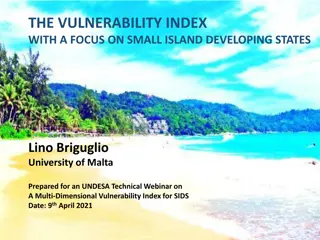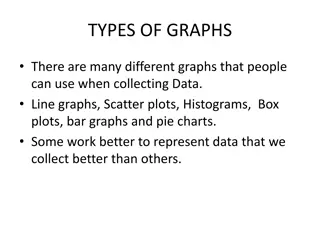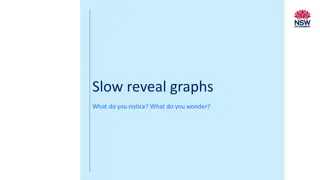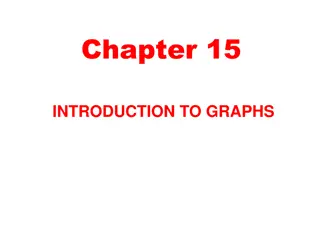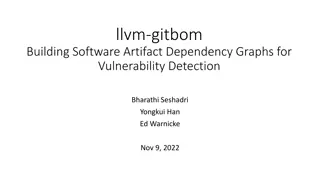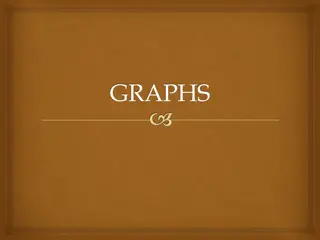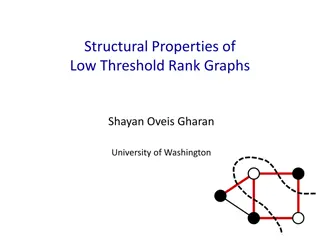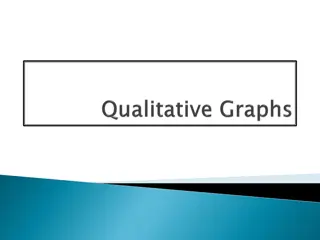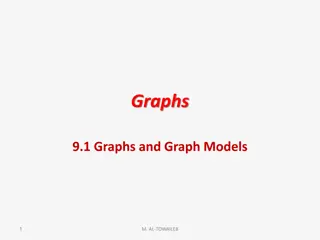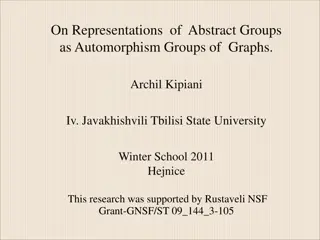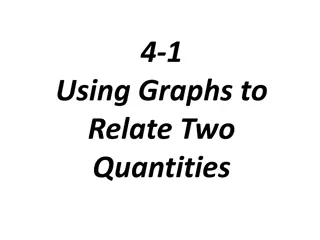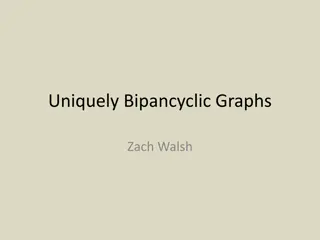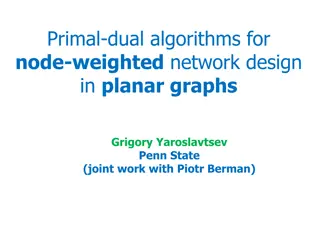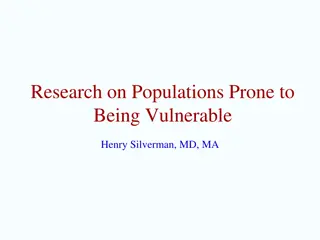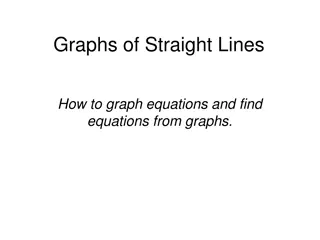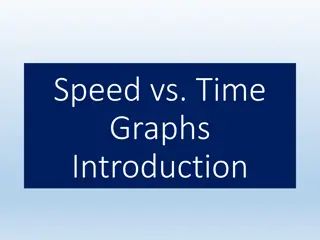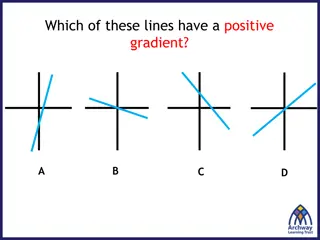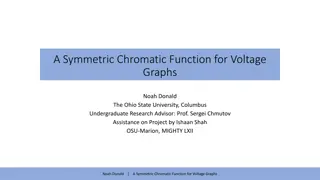Understanding the Vulnerability of Large Graphs in Network Analysis
This joint work delves into the vulnerability of large graphs in network analysis, focusing on immunization strategies to combat the spread of viruses. The study explores the optimization of immunization efforts by identifying the most crucial nodes for immunization, offering insights into safeguarding network structures in the face of potential threats.
Download Presentation

Please find below an Image/Link to download the presentation.
The content on the website is provided AS IS for your information and personal use only. It may not be sold, licensed, or shared on other websites without obtaining consent from the author. Download presentation by click this link. If you encounter any issues during the download, it is possible that the publisher has removed the file from their server.
E N D
Presentation Transcript
On the Vulnerability of Large Graphs Joint work by Hanghang Tong, B. Aditya Prakash, Charalampos Tsourakakis Tina Eliassi-Rad, Christos Faloutsos, Duen Horng (Polo) Chau ICDM 2010, December 13-17, 2010, Sydney, Australia
Motivation: Immunization Given: a graph A, virus prop model and budget k; Find: k best nodes for immunization. http://t2.gstatic.com/images?q=tbn:DvSaKUuCMp_swM:http://newscoma.com/wp-content/uploads/2009/04/whooping-cough.jpg http://t2.gstatic.com/images?q=tbn:DvSaKUuCMp_swM:http://newscoma.com/wp-content/uploads/2009/04/whooping-cough.jpg 16 23 24 http://t2.gstatic.com/images?q=tbn:DvSaKUuCMp_swM:http://newscoma.com/wp-content/uploads/2009/04/whooping-cough.jpg http://t2.gstatic.com/images?q=tbn:DvSaKUuCMp_swM:http://newscoma.com/wp-content/uploads/2009/04/whooping-cough.jpg 15 12 http://t2.gstatic.com/images?q=tbn:DvSaKUuCMp_swM:http://newscoma.com/wp-content/uploads/2009/04/whooping-cough.jpg 14 25 13 22 http://t2.gstatic.com/images?q=tbn:DvSaKUuCMp_swM:http://newscoma.com/wp-content/uploads/2009/04/whooping-cough.jpg 26 11 http://t2.gstatic.com/images?q=tbn:DvSaKUuCMp_swM:http://newscoma.com/wp-content/uploads/2009/04/whooping-cough.jpg http://t2.gstatic.com/images?q=tbn:DvSaKUuCMp_swM:http://newscoma.com/wp-content/uploads/2009/04/whooping-cough.jpg 21 9 27 34 20 10 1 4 28 8 33 19 2 http://t2.gstatic.com/images?q=tbn:DvSaKUuCMp_swM:http://newscoma.com/wp-content/uploads/2009/04/whooping-cough.jpg http://t2.gstatic.com/images?q=tbn:DvSaKUuCMp_swM:http://newscoma.com/wp-content/uploads/2009/04/whooping-cough.jpg 29 7 3 http://t2.gstatic.com/images?q=tbn:DvSaKUuCMp_swM:http://newscoma.com/wp-content/uploads/2009/04/whooping-cough.jpg 18 5 http://t2.gstatic.com/images?q=tbn:DvSaKUuCMp_swM:http://newscoma.com/wp-content/uploads/2009/04/whooping-cough.jpg 30 6 17 32 31 2 SARS costs 700+ lives; $40+ Bn; H1N1 costs Mexico $2.3bn
Motivation: Immunization Given: a graph A, virus prop model and budget k; Find: k best nodes for immunization. http://t2.gstatic.com/images?q=tbn:DvSaKUuCMp_swM:http://newscoma.com/wp-content/uploads/2009/04/whooping-cough.jpg http://t2.gstatic.com/images?q=tbn:DvSaKUuCMp_swM:http://newscoma.com/wp-content/uploads/2009/04/whooping-cough.jpg 16 23 24 http://t2.gstatic.com/images?q=tbn:DvSaKUuCMp_swM:http://newscoma.com/wp-content/uploads/2009/04/whooping-cough.jpg http://t2.gstatic.com/images?q=tbn:DvSaKUuCMp_swM:http://newscoma.com/wp-content/uploads/2009/04/whooping-cough.jpg 15 12 http://t2.gstatic.com/images?q=tbn:DvSaKUuCMp_swM:http://newscoma.com/wp-content/uploads/2009/04/whooping-cough.jpg 14 25 13 22 http://t2.gstatic.com/images?q=tbn:DvSaKUuCMp_swM:http://newscoma.com/wp-content/uploads/2009/04/whooping-cough.jpg 26 11 http://t2.gstatic.com/images?q=tbn:DvSaKUuCMp_swM:http://newscoma.com/wp-content/uploads/2009/04/whooping-cough.jpg http://t2.gstatic.com/images?q=tbn:DvSaKUuCMp_swM:http://newscoma.com/wp-content/uploads/2009/04/whooping-cough.jpg 21 See full size image 9 27 See full size image 34 20 10 See full size image See full size image 1 4 See full size image 28 8 33 19 2 http://t2.gstatic.com/images?q=tbn:DvSaKUuCMp_swM:http://newscoma.com/wp-content/uploads/2009/04/whooping-cough.jpg See full size image http://t2.gstatic.com/images?q=tbn:DvSaKUuCMp_swM:http://newscoma.com/wp-content/uploads/2009/04/whooping-cough.jpg 29 7 3 http://t2.gstatic.com/images?q=tbn:DvSaKUuCMp_swM:http://newscoma.com/wp-content/uploads/2009/04/whooping-cough.jpg 18 5 http://t2.gstatic.com/images?q=tbn:DvSaKUuCMp_swM:http://newscoma.com/wp-content/uploads/2009/04/whooping-cough.jpg 30 6 17 32 31 3 SARS costs 700+ lives; $40+ Bn; H1N1 costs Mexico $2.3bn
Challenges Given a graph A, and budget k, Q1 (Measure): how to measure the `shield-value for a subset of nodes (S)? Q2 (Algorithm): how to find a subset of k nodes with highest shield-value ? 4
Roadmap Motivation (Q1) Shield-value (Q2) Netshield Algorithm Experimental Results Conclusion 5
Background: SIS Virus Model [Chakrabarti+ 2008] Flu like: Susceptible-Infectious- Susceptible If the virus strength s < 1/ , an epidemic can not happen Intuition s # of sneezes before heal Largest eigenvalue # of edges/paths indicates the vulnerability of the whole graph A ! 6
Eigen-Drop: an Ideal `shield-value? Eigen-Drop(S)= - s 9 9 9 11 10 10 1 1 4 4 8 8 2 2 7 3 7 3 5 5 6 6 Original Graph: Without {2, 6}: s 7
Why not Use Eigen-Drop as `Shield-Value ? Select k nodes, whose absence creates the largest drop in - s We need in time Example: 1,000 nodes, with 10,000 edges It takes 0.01 seconds to compute It takes 2,615 years to find best-5 nodes ! Largest eigenvalue w/o subset of nodes S 8
Our `Shield-Value: Approx Eigen-Drop Theorem: (1) - s Sv(S)= i S 2 u(i)2- i,j S A(i,j)u(i)u(j) u = X A u u(i): eigen-score Footnote: u(i) ~ PageRank(i) ~ in-degree(i)
Intuition of the proposed `Shield-value Theorem: (Tong+ 2009) (1) - s Sv(S)= i S 2 u(i)2- i,j S A(i,j)u(i)u(j) find a set of nodes S (e.g. k=4), which (C1) each has high eigen-scores (C2) diverse among themselves Original Graph Select by C1 Select by C1+C2
The Proposed Alg.: Netshield Theorem: (1) - s Sv(S)= i S 2 u(i)2- i,j S A(i,j)u(i)u(j) (2) Sv(S) is sub-modular Corollary: (3) Netshield is near-optimal (wrt max Sv(S)) (4) Netshield is O(nk2+m) Example: 1,000 nodes, with 10,000 edges Netshield takes < 0.1 seconds to find best-5 nodes ! as opposed to 2,615 years Footnote: near-optimal means Sv(S Netshield) >= (1-1/e) Sv(S Opt) 11
Why Netshield is Near-Optimal? Marginal benefit of deleting {5,6} Marginal benefit of deleting {5,6} 3 9 10 3 9 1 10 5 1 5 2 6 2 8 6 7 8 7 4 4 Benefit of deleting {1,2} Benefit of deleting {1,2, 3,4} Sub-Modular (i.e., Diminishing Returns) >= 12
Why Netshield is Near-Optimal? 3 9 10 3 9 1 10 5 1 5 2 6 2 8 6 7 8 7 4 ' 4 >= Sub-Modular (i.e., Diminishing Returns) Theorem: k-step greedy alg. to maximize a sub-modular function guarantees (1-1/e) optimal [Nemhauster+ 78] 13
T4: Why Sv(S) is sub-modular? Newly deleted 3 9 10 1 5 2 6 8 7 4 Already deleted 14
T4: Why Sv(S) is sub-modular? Newly deleted Marginal Benefit of deleting {5,6} Sv(SgreenU Sblue) - Sv(Sgreen) = 3 9 10 - 1 i Sblue2 u(i)2- i,j SblueA(i,j)u(i)u(j) 5 2 6 ( i Sblue, j SgreenA(i,j)u(i)u(j)+ i Sgreen, j SblueA(i,j)u(i)u(j)) 8 7 4 Already deleted Pure benefit from {5,6} Interaction between {5,6} and {1,2} Only purple term depends on {1, 2}! 15
T4: Why Sv(S) is sub-modular? 3 3 9 9 10 10 1 1 5 5 2 2 6 6 8 8 7 7 4 4 Marginal Benefit = Blue Purple More Green More Purple Less Red Marginal Benefit of Left >= Marginal Benefit of Right Footnote: greens are nodes already deleted; blue {5,6} nodes are nodes to be deleted 16
Experiment: Quality of Netshield Optimal (better) Eig-Drop Netshield (1-1/e) x Optimal # of vaccines 17
Experiment: Comparison of Immunization Log(fraction of infected nodes) (better) Abnormality PageRank Between (short) Degree Between (RW) Acquaintance Eigs (=HITS) Netshield Time Epoch 18
Experiment: Speed of Netshield > 10 days >=1,000,000 Com-Eigs 100,000 10,000 Com-Eval Time 10,000,000x 1,000 (better) 100 10 Netshield 1 0.1 seconds 0.1 # of vaccines 0.01 NIPS co-authorship Network: 3K nodes, 15K edges 19
Experiment: Scalability of Netshield Time (better) # of edges X 108 20
Conclusion Prob. Dfn (Immunization) Given: a graph A, virus prop model and budget k; Find: k best nodes for immunization. Our Contributions Measure ( shield-value ) : Approx Eigen-Drop Algorithm: Scalable & Near-optimal 21


